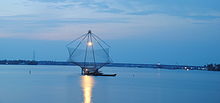This article needs additional citations for verification. (July 2012) |


Chinese fishing nets (Cheena vala in India or tangkul in Indonesia) are a type of stationary lift net in India and Indonesia. They are fishing nets that are fixed land installations for fishing. While commonly known as "Chinese fishing nets" in India, the more formal name for such nets is "shore operated lift nets".[1] Huge mechanical contrivances hold out horizontal nets of 20 m or more across. Each structure is at least 10 m high and comprises a cantilever with an outstretched net suspended over the sea and large stones suspended from ropes as counterweights at the other end. Each installation is operated by a team of up to six fishermen. While such nets are used throughout coastal southern China and Indochina, in India they are mostly found in the Indian cities of Kochi and Kollam, where they have become a tourist attraction.[2] This way of fishing is unusual in India and almost unique to the area, as it was introduced by Chinese explorers who landed there in the 14th century. Indeed, one interpretation of the city name Kochi is ‘co-chin', meaning ‘like China.’[3]
The system is sufficiently balanced that the weight of a man walking along the main beam is sufficient to cause the net to descend into the sea. The net is left for a short time, possibly just a few minutes, before it is raised by pulling on ropes. The catch is usually modest: a few fish and crustaceans, which may be sold to passers-by within minutes.
Rocks, each 30 cm or so in diameter, are suspended from ropes of different lengths. As the net is raised, some of the rocks one-by-one come to rest on a platform thereby keeping everything in balance.
Each installation has a limited operating depth. Consequently, an individual net cannot be continually operated in tidal waters. Different installations will be operated depending on the state of the tide.
The nets may have been introduced by the Chinese explorer Zheng He.[4]
The Chinese fishing nets have become a very popular tourist attraction. Their size and elegant construction are photogenic and the slow rhythm of their operation is quite hypnotic. In addition, catches can be purchased individually and need be taken only a short distance to a street entrepreneur who will cook them.
- ^ Shore operated stationary lift nets Archived 13 June 2006 at the Wayback Machine.
- ^ "Panoramio - Images from Kollam ashtamudi". Archived from the original on 24 September 2015. Retrieved 14 April 2015.
- ^ "11 Essential Experiences for a Kerala Backpacking Trip".
- ^ U.S. News & World Report, Volume 136, No 21, p. 53. 14 June 2004.